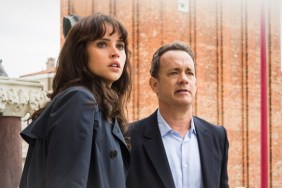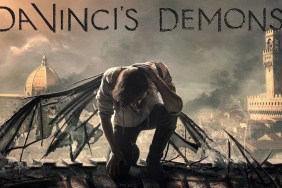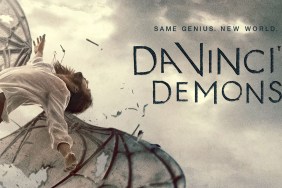Tom Hanks as Robert Langdon
Audrey Tautou as Sophie Neveu
Ian McKellen as Sir Leigh Teabing
Alfred Molina as Bishop Aringarosa
Jürgen Prochnow as André Vernet
Paul Bettany as Silas
Jean Reno as Bezu Fache
Etienne Chicot as Lt. Collet
Jean-Pierre Marielle as Jacques Sauniere
Clive Carter as Detective Chief Inspector (Biggin Hill)
Seth Gabel as Michael the Cleric
Marie-Françoise Audollent as Sister Sandrine
David Bark-Jones as Richard
Jean-Yves Berteloot as Remy
Directed by Ron Howard
Summary:
It’s just not that the movie is way too long and duller than watching Da Vinci’s paint dry, but it takes away any of the book’s little credibility and makes the flaws in it that much more obvious.
Story:
Religious symbologist Robert Langdon (Tom Hanks) has been called to the Louvre in Paris to help the police with their investigation into the murder of its curator. Once he gets there, he learns that he’s the prime suspect and with the help of a police cryptographer (Neveau) and a British scholar (Ian McKellen), he must track down a sacred item that others have already killed to find.
Analysis:
There are only two ways to review this movie, either by comparing it to Dan Brown’s bestselling novel or by comparing it to other movie experiences. Normally, the former would be the easier route to take, but if you have an even remotely active imagination, you already have a picture in your mind about how the characters and situations depicted in the book should look. Films rarely can fully capture that sort of competition, but at least in cases like Thomas Harris’ “Hannibal,” it offers strong performances and stylish filmmaking to make up for the book’s flaws. Ron Howard’s take on Brown’s novel, adapted by Oscar winner Akiva Goldsman (“A Beautiful Mind”), offers neither.
The original story involves a quest for the Holy Grail, which apparently isn’t the same chalice sought by Indiana Jones and his father, but that search quickly turns into a revisionist history lesson revealing the “true” history of the Knights Templar and the Grail. You know, the stuff they forgot to teach us in Sunday School, which conveniently ended up on the cutting room floor of “The Passion of The Christ.” The quest by Langdon and his collaborators to discover this two-thousand year old mystery has him being chased by French police and a ruthless albino agent of Opus Dei. Contrary to earlier apprehensions, the various churches don’t come across nearly as bad as the French police do, thanks to the ruthless techniques used by Jean Reno’s Bézu Fache.
The problem isn’t that this movie veers away from the book, so much that it’s far too literal. The amount of talking and exposition in the book doesn’t really translate into an interesting movie, and anyone expecting anything close to a thriller will be frustrated by the surprising lack of tension, suspense or excitement. At least when you read the book, you can set it down when the religious babble gets to be too much, but sitting through two and a half hours of it is like being chained to a desk for an extended history lecture.
While some may choose to believe some of the religious theories raised in the book, when it’s talked about aloud between the main characters, it comes across as ludicrous. Even when the movie tries to find new ways to tell the story, it comes up with silly ideas like Langdon using a cell phone web search to decipher the clues. If only it were that easy to find the Grail! The only time the movie ever rises above a snail pace is when someone is being hit in the face or getting shot at.
Whatever you want to say about Brown as a writer, he has a way of creating vivid characters, and despite all the talk of the Grails and such, little is done to embellish the characters or make them particularly enticing. It’s sorely lacking the type of omniscient exposition that makes fiction enjoyable, leaving it to the actors’ words and actions to sell their characters.
Many have questioned the choice of Hanks for the role of Langdon, so to counter that poor decision, Hanks acts as “non-Tom-Hanks-like” as possible, defeating the purpose of hiring an actor of his talents and charm to play such a key role. The only depth he brings to the character is by overplaying Langdon’s claustrophobia, something that’s barely made reference to in the book.
Likewise, Audrey Tautou, the lovable star of “Amelie,” casts aside most of the sweetness and charm we’ve come to love her for, as she struggles through her English lines. About midway through, her character starts showing a bit of spunk and toughness but those moments come and go and then it’s back to the serious talking again.
Really, the film’s only saving grace is Ian McKellen as the lecherous scholar Sir Leigh Teabing, who provides the movie’s only departure from all the gravitas with some light-hearted banter and one-liners. He plays the part as if his lines were written by Shakespeare himself, and it does wonders at keeping the movie from being a complete waste of time.
Otherwise, the movie is a hodgepodge of subtitles and bad accents, one of the most atrocious ones coming from Paul Bettany as Opus Dei enforcer Silas. With all the languages being thrown around, it’s a surprise that anyone understands what anyone else is saying. Even worse is the liberal amount of scenery chewing, mostly by Bettany, but also by Molina and others, to try to wake the audience up. The only actor who plays things down is Hanks, which makes no sense since it just makes Langdon that much less interesting than his supporting cast.
Regardless, the movie is far too long, and it wouldn’t have hurt to spend less time on the history lessons, elaborately recreated using what appears to be outtakes from “Passion” and “Kingdom of Heaven.” After the climactic face-off between Langdon, Neveu and the mysterious “Teacher” who is orchestrating all of it, we’re presented with a dull epilogue that’s an even bigger let-down.
It wouldn’t be so bad if the film were cinematically interesting, but it lacks the style of other recent films, including most of Ron Howard’s. Little more than a travelogue of European landmarks, the film looks dull due to the lack of strong colors, and relies far too heavily on close-ups of the various characters. Most of the flashbacks have a grainy muted look that’s even less visually stimulating, and the whole experience is dragged down by a canned Hans Zimmer score so overbearing that you relish the silence.
Having recently seen the new remake of the ’70s horror classic “The Omen” certainly didn’t help, because at least the spiritual mysteries in that one are handled in a more plausible manner than anything in “The Da Vinci Code.” A few beheadings would have done wonders at making this movie more interesting and exciting; I would start with the producers.
The Bottom Line:
Fans of the book may enjoy finally seeing the characters on the screen, but for the most part, the movie adds nothing new to the experience for anyone who’s read the book, and little of interest to anyone who hasn’t. Ultimately, it makes the flaws in Brown’s source material–the storytelling ones, not anything to do with the religious theories–that much more apparent. “The Da Vinci Code” may just be one of those cases of a book that doesn’t translate well onto the screen, but at least it will ensure that the lines to the Louvre will be even longer.










